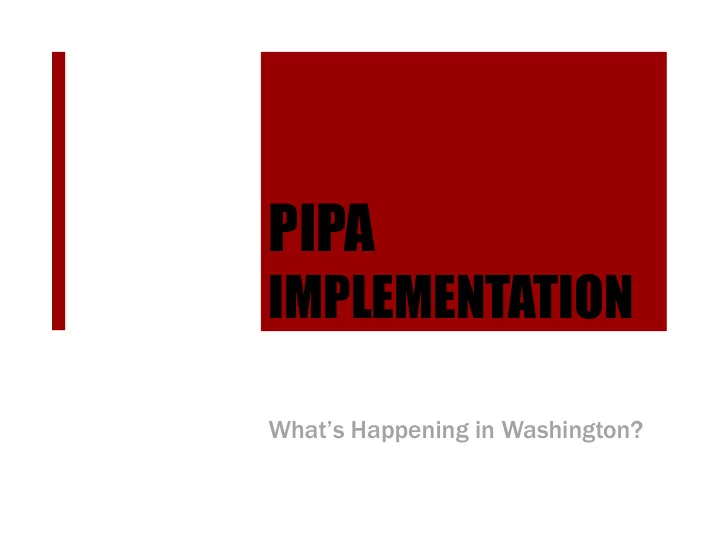

PIPA IMPLEMENTATION What’s Happening in Washington?
Pre-PIPA Groundwork in Washington ¡ 2000: Establishment of Governor-Appointed Citizens Committee on Pipeline Safety ¡ 2004-06: Series of workshops across state with local government officials, planners, industry to explore tools for improving land use decisions near pipelines ¡ 2006: Report published: “Land Use Planning in Proximity to Natural Gas and Hazardous Liquid Transmission Pipelines in Washington State”
Pre- PIPA Groundwork, continued ¡ MRSC established web page on planning near pipelines, provides sample ordinances, reports, background information ¡ WUTC provides GIS map layers to local governments ¡ 2009: Trust, using TAG GRANT, undertakes research to identify barriers to development of local ordinances, creates implementation plan
Results of Research in Washington ¡ Using surveys, focus groups and interviews, we identified: ¡ what information planners needed: background, examples of working ordinances ¡ who should deliver it: MRSC, WUTC, AWC, ¡ where they usually obtain their information: MRSC, AWC, APA, AICP ¡ what other barriers they saw to development and adoption of a consultation zone ordinance, money, political concerns ¡ what incentives would be helpful: grants, sample ordinances, free technical assistance
Current Efforts in Washington ¡ 2010 TAG grant awarded to the Association of Washington Cities to use research results and implementation plan from previous work ¡ In partnership with Trust, MRSC, and WUTC: webinar produced – available on MRSC and Trust website ¡ Appearances at NACO, planning gatherings ¡ Presentations to cities, counties upon request ¡ Mini-grants of $3000 awarded to cities and counties willing to commit to drafting a pipeline safety ordinance
Current Efforts ¡ Five cities (Sultan, Roy, Gold Bar, Kirkland and Bellingham) currently in various stages of ordinance development ¡ Skagit County received its own 2010 TAG grant: proposal, pushback, salvage effort
Lessons learned ¡ Background work essential: find out what barriers are, who trusted messengers are, how to approach planning staffs, identify local champions ¡ Identify operator contacts for local governments – help from WUTC ¡ Personal contact, availability of presenters ¡ Free ongoing technical assistance ¡ Money
Future Challenges ¡ In Washington, where memories of the Bellingham incident still linger, identified barriers were overcome, messengers were identified, presentations made, staff time compensated, technical support supplied, and… ¡ 5 cities accepted mini-grants to develop a PIPA ordinance. 2 others responded, but chose not to follow through. ¡ Is this a model that can be scaled up to a nation-wide implementation program?
Rebecca Craven Program Director Pipeline Safety Trust rebecca@pstrust.org (360)543-5686
Recommend
More recommend